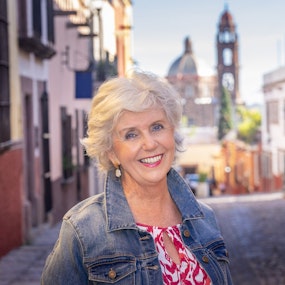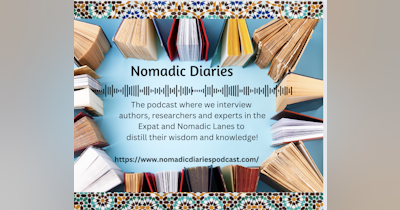A phrase often heard in our house in Mexico when discussing the gap between what we observe and what we understand is frequently "It's All Cultural". This is the way we explain away experiences we don't understand.
However, over the last seven weeks listeners of Nomadic Diaries have been privileged to undergo some intense schooling on what culture truly is and the hidden effects it has on us all the time. A variety of subjects including intercultural intelligence, competency and communication were tackled in an effort to translate these academic subjects into functional and basic actions that the everyday expat or nomad can deploy while living overseas.
We are thrilled and excited by the brilliance and the high level thinking along with the practical down-to-earth recommendations that came up. We are grateful to each of our experts for their heartfelt sharing.
The following is a summary of the main points we learned.
A Look at Cultural Intelligence – with Polly Collingridge
"Cultural intelligence is not just about learning to navigate the waters of diverse cultures; it's about being willing to dive into those waters with an open mind—treating every interaction as an opportunity to both teach and be taught, and embracing the rich tapestry of human experience with curiosity and humility." - Polly Collingridge
- The Essence of Cultural Intelligence (CQ): At the heart of our conversation, we explored the concept of cultural intelligence as the ability to cross cultural boundaries with grace and effectiveness. Polly explained the four main capabilities of CQ: drive, knowledge, strategy, and action.
- Assessment and Growth in Cultural Intelligence (The Cultural Intelligence Scale): With over 150 peer-reviewed papers backing the Cultural Intelligence Scale, Polly highlighted its validity as an assessment tool. The test takes only 15 minutes and examines a person's cultural preferences across ten dimensions—offering a personalized snapshot of one's CQ that can evolve with time and experience. Polly and Doreen discussed the significance of self-awareness in cultural intelligence, suggesting that understanding our personal biases is key to interpersonal growth.
- Cultural Intelligence in Digital and Generational Spaces: We covered CQ's relevance in modern contexts, such as digital communications and generational differences. Polly and Doreen discussed how tools like emojis are shaping new forms of expression. These insights emphasize the need for adaptability across various platforms of interaction.
Listen, Learn, Love - How to Master Intercultural Competence - with Nick Dunn
"The core messages that Nick shares and teaches are 'listen, learn, and love,' emphasizing the importance of understanding and embracing cultural differences.”
- Embrace a "Third Way: Learning how to combine different perspectives to find innovative solutions and communicate more effectively in a multicultural environment is a journey, not an overnight sensation.
- Cultivate Cultural Empathy: By discovering the business advantages of multicultural teams, we can all do better together when working cross-culturally. When we foster an inclusive environment that respects and includes more people, this enhances the success of the entire team.
- Engage with Playfulness: Nick takes a very playful approach to teaching intercultural skills. He is a huge proponent of the power of bringing playfulness into your interactions to ease tension and encourage a forgiving attitude toward language and cultural missteps that we all inevitably make. He suggests that we deliberately expose ourselves to diverse experiences to build cultural complexity and agility.
Cultivating Open-Mindedness Abroad – with Syed Zafar
"The Platinum Rule trumps the Golden Rule in intercultural relations: It's about treating others the way *they* want to be treated, not how *we* think they should be treated, and that requires really leaning into and learning from the diversity of the world around us." – Syed Zafar
- Navigating Cultural Challenges for Global Nomads: We dove into Syed's personal anecdotes and expertise about living in culturally diverse environments such as on a compound in Saudi Arabia. Syed discussed the complexities of adjusting to cultural norms both inside and outside such enclosed spaces, and the necessity of developing traits like open-mindedness and tolerance for ambiguity.
- The Essence of Cultural Intelligence in a Globalized World: Syed's experience with ExxonMobil's restructuring as a backdrop provided how relevant corporate culture is and how much it is needed. Understanding and adapting one’s behavior to accommodate different cultural practices is essential in corporate settings and is really at the heart of Syed's work.
- Adapting to New Cultures: There are so many practical benefits from acclimating to a new culture. Syed taught us the DIE rule (Describe, Interpret, Evaluate), and the shift from the golden rule to the platinum rule. We covered the importance of adaptability, establishing a routine, and maintaining physical and mental health through good nutrition, exercise, and stress management. It all counts towards intercultural balance.
- Transitioning from Tourist to Traveler by Embracing Local Experiences: The distinction between being a tourist and becoming a traveler was visited. Syed underscored the importance of immersing oneself in the local culture, learning the language, and respecting societal norms. Syed's perspectives and tips on how to make meaningful connections and seek purposeful experiences that go beyond surface-level tourism were very practical and much appreciated.
Wizard of Oz Moments in Cultural Adaptation – with Vanessa Paisley
"Understanding cultural differences is not about changing who you are, but rather about switching off your cultural autopilot to minimize biases and building bridges to meet others halfway in this global village."
- Using Brain, Mind, and Culture Studies: "What I like about this brain, mind and culture approach is that the research is not self-generated. You don't take an assessment tool and say, well, this is the way. The science of mind and culture is more about how people think differently and then looking at culture from a psychological perspective."
- Embracing New Cultures with Self-Care: "If you're going to live in a culture for a while, don't forget some of your good habits and behaviors that you've had at home, whether it's some form of sport or meditation or reading. Take those with you. Don't leave them at home and think, oh, I'm going to go and have a new life and leave all of that behind, because that's also really important that you develop some good habits while you're living or traveling, because I think that helps with your mental health."
- Examples of Cultural Learning Opportunities:
- Punctuality: Vanessa gave an example of an Indian fellow who was teaching a course and was late. I asked him about it and he said ’oh no, if you're the boss you don't have to be on time because it means I'm busy, we've got a lot of work; it means I'm head of a successful organization.’ If I arrive early my students will start worrying that this place is not doing very well financially."
- Go beyond the surface: you really experience culture when you're in the country, when you're on the bus, listening to a conversation in the shop, trying to buy something, going to school.
- Small talk is very important in cross cultural or intercultural scenarios. The smallest efforts to communicate in another language is critical to success.
Adaptation: The Ultimate Superpower – with Renata Urban
"Culture is like water to fish; it surrounds us and influences us in ways we don't even notice until we step out of it." This shows the unconscious impact our own culture has on us until we're faced with a different one.
Renata outlined 5 steps to cross cultures well:
- Self-awareness: The first step involves individuals gaining an understanding of their own cultural backgrounds, biases, and preferences. Recognizing one's personal values and how they might differ from those of other cultures is crucial for cross-cultural interactions.
- Awareness of the new culture: This step requires individuals to learn about the culture of the country or environment they are entering. This includes understanding local customs, values, communication styles, and societal norms.
- Gap analysis: Renata encourages identifying the differences between one's own culture and the new culture. This gap analysis helps individuals pinpoint areas where they might face challenges due to cultural differences and helps in strategizing ways to bridge these gaps.
- Realizing there is no better or worse, only different: Acceptance that different cultures have different ways of doing things, and that no single way is inherently superior, is critical. This mindset fosters respect and openness towards the new culture.
- Stretching their comfort zone: The final step involves individuals pushing themselves beyond their comfort levels to truly engage with the new culture. This could involve trying new foods, participating in local traditions, or learning the language. Challenging oneself to adapt and grow is key to successful cultural immersion.
Thanks so much to everyone who contributed to these five episodes which can be found here.
Please listen, like and subscribe to Nomadic Diaries, we would love to hear from you and what else you would like us to talk about!
https://www.nomadicdiariespodcast.com/episodes/
https://www.nomadicdiariespodcast.com/a-look-at-cultural-intelligence-polly-collingridge/
https://www.nomadicdiariespodcast.com/listen-learn-love-how-to-master-intercultural-competence/
https://www.nomadicdiariespodcast.com/-wizard-of-oz-moments-in-cultural-adaptation/
https://www.nomadicdiariespodcast.com/cultivating-open-mindedness-abroad/
https://www.nomadicdiariespodcast.com/adaptation-the-ultimate-superpower/






